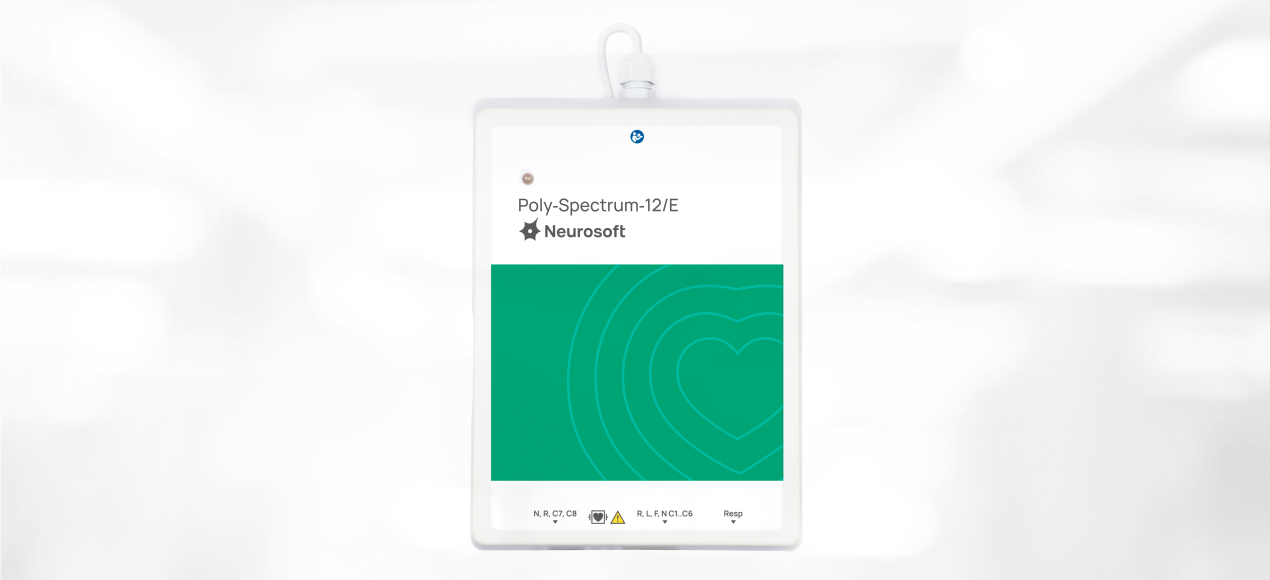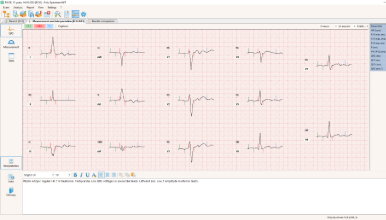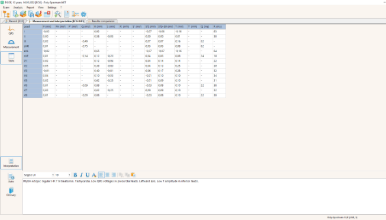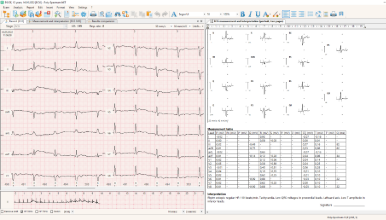Poly-Spectrum-12/E
15-Channel Digital ECG System with Transesophageal ECG Lead Recording and Pacemaker Pulse Detection
- 12 standard ECG leads, 2 transesophageal ECG leads, 1 respiratory channel
- high-quality recording among this class of devices
- pacemaker pulse detection
- automatic ECG measurement and interpretation
- automatic report generation

Learn more about methods and equipment
Description
12 Standard ECG Leads, 2 Transesophageal ECG Leads, 1 Respiratory Channel
If you use Poly-Spectrum-12/E, the transesophageal ECG lead recording may be performed simultaneously with 12-lead ECG. The additional channels are developed so that transesophageal electrode polarization in the process of stimulation does not block ECG recording.
The additional channels can also be used to record V7 and V8 chest leads.
High-Quality Recording Among This Class of Devices
The sampling rate increased up to 10000 Hz allows receiving clear and detailed ECG recordings under any conditions. Thanks to high-quality hardware and software filters as well as the advantages of 24 bits A/D converters, there is no baseline displacement of ECG leads both during cardiac stimulation and exercise testing.
Pacemaker Pulse Detection
The software detects pacemaker (implanted or transesophageal) pulses automatically. It allows specifying the QRS complexes precisely by excluding the pacemaker pulses from the analysis. During the recording review, the pacemaker pulses are represented by the special markers.
Automatic ECG Measurement and Interpretation
In ECG measurement mode a physician can see the selected QRS complex or the one averaged by all the entire record. The software sets the markers automatically in the reference points of the QRS complex. If the physician clicks the QRS complex in any lead with the mouse, it can be zoomed in, measured with the software ruler and markers can be corrected manually if it is necessary.
Automatic Report Generation
After the test completion, the report is generated automatically. It includes QRS complex images for all leads, measurement tables, and automatic interpretation. A physician can make any changes to the report. It is possible to generate and print the report automatically.
Support of HL7 and DICOM Standards Allows Integrating All Diagnostic Neurosoft Systems into the Information System of a Healthcare Facility
Nowadays all large medical centers and a range of small clinics are equipped with information systems intended to store and process their medical data. To make their workflow reliable and effective the software shall interface with such systems.
HL7 (Health Level 7) is the most commonly used interface engine for the exchange, integration, sharing and retrieval of electronic health information. Neurosoft software supports data exchange via HL7. Nevertheless, HL7 defines just a message format and general principles of data transfer while each specific information system can use its own messaging standards. The specialists of our company can easily set up the software to fit the needs of any clinic and thus provide the most effective integration via HL7.
Neurosoft software also supports DICOM network protocol. Using DICOM modality worklist the diagnostic software can interchange data with the information system of a clinic: obtain data regarding the required studies and transfer the results of performed studies to the information system of a clinic.
The support of HL7 standard allows integrating all diagnostic Neurosoft systems into the information system of a healthcare facility.Delivery Set
The delivery set can differ from country to country. Request the actual delivery set for your country from your local representative.
| Poly-Spectrum-12/E electronic unit | 1 pcs. |
| ECG cable (3.1 m, 10-lead, for Poly-Spectrum-8, 8/E, 8/EX, 12/E, China) | 1 pcs. |
| ECG cable (2.5 m, 2 lead, for Poly-Spectrum-12/E, China) | 1 pcs. |
| Reusable limb clamp ECG electrode (adult, price for 1 pcs., comes in packs of 4 pcs.) | 4 pcs. |
| Reusable precordial suction chest ECG electrode (adult, D=24 mm, price for 1 pcs., comes in packs of 6 pcs.) | 8 pcs. |
| Adapter for transesophageal electrode | 2 pcs. |
| Stand mount | 1 pcs. |
| SU-3 stand for electronic unit | 1 pcs. |
| License for the use of software "Poly-Spectrum.NET" with additional software module "Poly-Spectrum.NET/Analysis" | 1 pcs. |
| User Manual «Stand for Electronic Unit SU-3» | 1 pcs. |
| Package set | 1 pcs. |
Options
-
Поли-Спектр-12Е_Регистрационное удостоверение_RF_06.06.2016
5,83 MB
-
Выписка из единого реестра российских программ для ЭВМ ПО "Поли-Спектр.NET"
190,96 KB
-
Свидетельство о регистрации ПО Поли-Спектр.NET
387,07 KB



